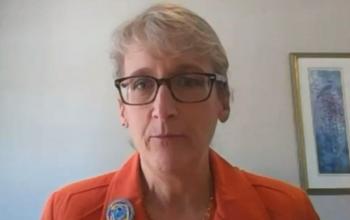Image Caption
Indigenous Services Canada has heard the concerns and is changing the nursing rotation into remote and isolated First Nations communities.
“Communities have spoken,” said Robin Buckland, executive director & Chief Nursing Officer, Indigenous Services Canada.
They are going to a four-week rotation of nurses in communities, preceded by two weeks of self-isolation and screening for COVID-19.
In early April, the Federation of Sovereign Indigenous Nations reported that an infected nurse had brought COVID-19 into a remote northern Saskatchewan community. She treated people in long-term care, seniors and vulnerable people in hospital, resulting five patients going into self-isolation. It was the second time a health care worker had infected a First Nation in the province.
The FSIN called for measures to be put in place to ensure health workers serving First Nations were tested for COVID-19 prior to their arrival, and that they were properly equipped with PPE (personal protective equipment).
Buckland said the department had also implemented what they called “ISC Air”, a chartered airline system that will help transport nurses to isolated communities, avoiding busy airports and reducing the risk of being exposed to COVID-19.
“Our maiden voyage was yesterday,” she said on a livestreamed town hall hosted April 23 by the First Nations Health Managers Association.
“And we had a great big purple Montreal Alouettes jet take the nurses from Newfoundland” to places where they could connect with smaller planes into the isolated communities.
Buckland said they got “quite a kick out out of” the fact that it was a Alouettes’ jet.
“We’ve always known that nurses are the quarterbacks of the health care system. And yesterday’s purple jet flying across the country with nurses really underlined that for me.”
Indigenous Services Canada has also increased the number of registered nurses, licensed practical nurses and paramedics that can be accessed by remote and isolated First Nations communities and nursing stations during the pandemic.
She said there really was an opportunity to help flatten the curve for Canada, and for First Nations to stay “ahead of the wave.”
The wave refers to a second wave of virus infections expected as provinces reopen their economies. Saskatchewan has today announced a five phase plan.
The first phase will begin on May 4 (access to dentistry, optometry, physical therapy, occupational therapy and chiropractic treatment, and low-risk outdoor recreational activities, including golf). Phase two begins on May 19 (retail businesses and some personal services, including hairdressers and barbers, registered massage therapists and acupuncturists). Physical distancing measures apply, and where that isn’t possible, masks and gloves must be used.
Buckland said the conversations and collaborative work undertaken by the department and First Nations, as well as upgraded pandemic plans and public health messaging, will be important during this second wave.
Good surveillance as the restrictions lift is critical, she said. That means having the testing in place to be able to identify any hot spots or outbreaks, including quick point-of-care testing in communities.

